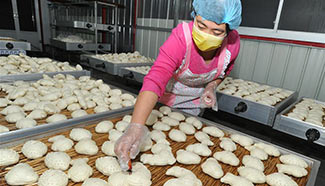LONDON, Jan. 25 (Xinhua) -- Young children in nurseries are at the frontline of a drive to help save millions of lives, new advice from Public Health England (PHE) said Wednesday.
Staff at kindergartens and nurseries have been told to teach young kids how to properly wash their hands as a measure to fight antimicrobial resistance.
Advice on health care is also being offered to teens leaving home for the first time to live in student accommodation at universities.
PHE, the official health body in England, warns that if antimicrobial resistance continues to increase at the current rate, it could result in the deaths of 10 million people a year globally by 2050, mostly dying as a result of ordinary infections, or from routine operations due to the risk of infection.
The new guidance published Wednesday, recommends children in nurseries and young people at university be taught when and how to wash and dry their hands, for example after going to the toilet and before preparing food, in order to prevent the spread of infections.
"Young people living away from home for the first time should also be given information about how to care for themselves when they get an infection that will resolve itself over time, for example, a common cold or flu," said PHE in its guidance.
The guidance by Britain's National Institute for Health and Care Excellence (NICE) and PHE is aimed at National Health Service (NHS) organisations, local authorities, and health and social care professionals so they can provide information to people in their care.
NICE also says the public should be made aware of when it is appropriate to take antimicrobial medicines and the risks associated with their overuse and misuse.
Professor Gillian Leng, deputy chief executive and director of health and social care at NICE, said: "Antimicrobial resistance is a problem that is happening now and will get worse without action at all levels."
"There are already common infections that are resistant to antimicrobials. Without sustained changes to the way we manage infections and protect these medicines, some routine medical procedures will become fatal."
Education is key, she said.














